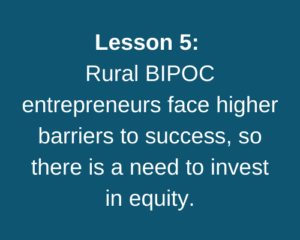Lessons Learned from Ecosystem Building in Oregon: Lesson 5

“Business people on the reservation have many barriers to success, and it will take years of concerted effort to address these barriers and provide entrepreneurs with a chance for success.”
– Chris Watson, Executive Director, Warm Springs Community Action Team
Many factors put rural entrepreneurs at a disadvantage, including lower quality broadband, more sparsely available support services, fewer mentors and examples, fewer options for start-up and investment capital, and a pervasive narrative of deprivation. However, some entrepreneurs within rural areas in the Pacific Northwest face higher barriers to entrepreneurship than others, and for the rural entrepreneurs participating in the Kauffman-funded ROI program, this included particularly tribal and Latiné entrepreneurs. Gustavo Morales, Executive Director of EUVALCREE, has reported that “POC/minority entrepreneurs often experience challenges in accessing local and state level support, and require a significant amount of awareness raising and trust development that there are resources available to support entrepreneurial success.”
In this program, we found that rural Latiné entrepreneurs specifically need financial literacy, bookkeeping, and tailored support from a trusted, familiar source, in Spanish and at a time that works with other family and work obligations. Traditional support providers such as Chambers of Commerce, SBDCs, and government agencies have not always understood how or have not been able to tailor services in this way. Also, RDI has found that Spanish speaking entrepreneurs are often interested in multi-level marketing companies, so awareness raising about their risks can be of value.
The Warm Springs Community Action Team (WSCAT) is working with tribal entrepreneurs on the Warm Springs Reservation who face particularly high barriers to entrepreneurial success. Access to office and retail space and land are a problem due to zoning laws and Bureau of Indian Affairs bureaucratic hurdles in accessing land. People also lack access to capital, and the lack of a skilled workforce for small business and lack of knowledge in how to operate a business (particularly financial skills) are also major hindrances. WSCAT is addressing these myriad challenges through their Commissary incubator project, which will include a food cart pod, commercial kitchen, shared office space, and retail spaces, as well as wrap-around support services to entrepreneurs.
The pandemic has added a layer of difficulty to this work, and has pushed organizations to be flexible and creative in their approaches in order to make some progress. Chris Watson, WSCAT Executive Director described the situation this way: “Though many of our best-laid plans have not been achieved due to the pandemic and the water infrastructure crisis on the reservation, we have been able to open a cafe/art store, operate a food cart, provide counseling through conference calls, provide e-marketing services, and administer COVID-19 emergency small business funding programs serving hundreds of tribal and community members. This is through adaptability and simple tenacity; our staff continues to stay on mission and work for the community using teleconferencing, effective COVID-19 safety measures, and ongoing follow-through.”
There is a need to increase investment to build equitable ecosystems for all entrepreneurs, and to ensure that basic resources and infrastructure are in place in every community. We will note that the entrepreneurs that our community partners are supporting are disproportionately (around 70%) women. We believe this is because women are more likely to reach out for support than their male counterparts, and not that there are more women entrepreneurs overall.
Investing in marginalized and underrepresented entrepreneurs has value both for the entrepreneur and for the community. This work is about building up people – instilling confidence, agency, and expanding opportunities. And it is also about building resilient and vibrant communities. “We see entrepreneurship as a strategy for building leadership. We help people who are low income and/or very under-resourced in the margins, with accessible and inclusive first step business training and support, to help them start a small business, get it ready to grow, move out of poverty, and become leaders in building resilient and equitably shared community wealth,” explains Mike Skinner, about the work of the Center for Inclusive Entrepreneurship.
“Arming somebody with their own small business is a way of giving them an opportunity to lead as business owners, as true stakeholders in the local economy and the local community.”
– Mike Skinner, Executive Director, Center for Inclusive Entrepreneurship
